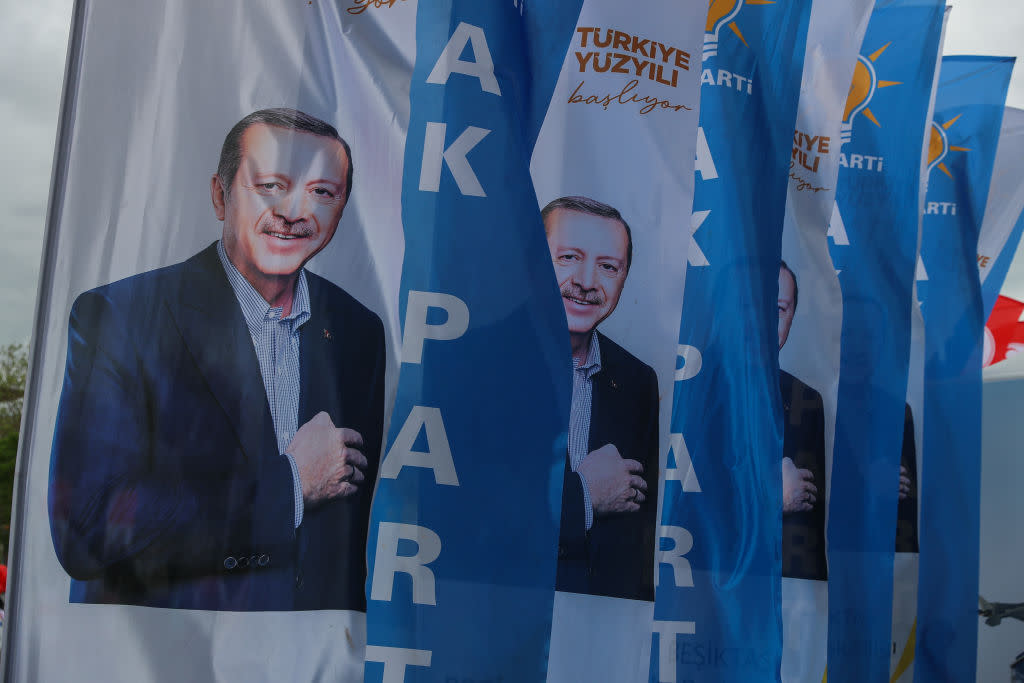Erdogan Is Facing His Biggest Test—Even If He Loses Turkey's Election

- Oops!Something went wrong.Please try again later.
Posters Turkish President and People's Alliance's presidential candidate Recep Tayyip Erdogan waves on May 10, 2023 in Istanbul, Turkey. On May 14th, Turkey's President Erdogan will face his biggest electoral test as the country goes to the polls in the countrys general election. Erdogan has been in power for more than two decades first as prime minister, than as president but his popularity has recently taken a hit due to Turkey's ongoing economic crisis and his government's handling of series of devastating earthquakes that struck the country's southeast in early February, killing more than 50,000 people. Credit - Aziz Karimov/Getty Images
For more than 20 years, Recep Tayyip Erdogan has remade and dominated Turkey’s politics. First as Prime Minister, then as President, he built a political foundation with support from voters outside the country’s powerhouse cities—Istanbul, Ankara, and Izmir—with appeals to traditional religious values and socially conservative policies.
Over time, however, he has also polarized the country by amassing more and more executive power in his own hands, and by silencing, in some cases imprisoning, critics and journalists who tell stories he doesn’t like. He has sidelined judges who don’t rule his way. Following a failed military coup in 2016, he purged the upper ranks of the army.
Now he faces his toughest test. The largest opposition parties have united behind the candidacy of a single challenger, a technocrat named Kemal Kilicdaroglu. Voting begins on May 14, and a second-round runoff on May 28 appears likely between the combative and charismatic Erdogan and the mild-mannered and consensus-oriented Kilicdaroglu. Current polling says this race could go either way.
Outsiders will focus on expected differences in their foreign policies. Even as a member of the NATO alliance, Erdogan has established a degree of independence between the West and Russia. At various times, he has both courted and infuriated Russia, Europe, and the U.S. with a transactional approach to nearly every important question. His ability to play one off the other is limited by Turkey’s dependence for security on NATO and on Russia for a strong economy, particularly in the tourism sector. Erdogan has not joined other NATO members in full backing for Ukraine, but he has offered Turkey’s services as a crucial dealmaker, including on the flow of both Ukrainian and Russian agricultural products out of the Black Sea and into the Mediterranean. Erdogan’s harsh words for the E.U. and some European governments, and his foot-dragging on questions like NATO membership for Finland and Sweden, has made him a gadfly in Brussels.
That’s the main reason a Kilicdaroglu victory would be welcomed in Europe and in Washington. His foreign policy would focus on restoring trust in Turkey’s reliability as an ally for both NATO and the E.U., even as he continues to approach Vladimir Putin with pragmatic caution. Kilicdaroglu would also be expected to breathe new life into Turkey’s long-term bid to join the European Union. If so, E.U. officials would respond with warm diplomatic pleasantries, but the cost of support for Ukraine and hesitancy in Europe about Turkey’s longer-term direction will encourage Brussels to slow-play a return to serious accession negotiations.
Yet there’s a more immediate question that has the attention of observers both inside and outside Turkey. If Kilicdaroglu wins the presidency by a razor-thin margin, might Erdogan simply reject the result? He’s done it before. When his party’s candidate lost the race for mayor of Istanbul in 2019, Erdogan forced Turkey’s electoral court to annul the result and rerun the election. This strategy would work only if the vote is close, but the stakes for Erdogan are now much higher. This time, it’s his name on a nationwide ballot. If Erdogan hesitates, it would likely be because his party then lost that re-run Istanbul mayor’s race by a much bigger margin, dealing Erdogan’s reputation for political invincibility a blow from which it hasn’t fully recovered.
It would still be a mistake to under-estimate Erdogan’s willingness to urge his supporters into the streets, and opposition demonstrators would be quick to respond, creating political upheaval. It would also be a mistake to doubt Erdogan’s ability to win. His political talent and the loyalty of his supporters remain formidable.

